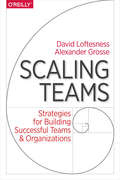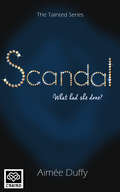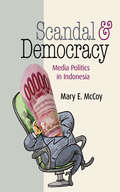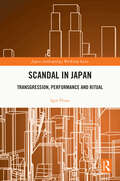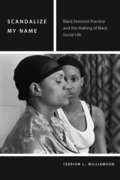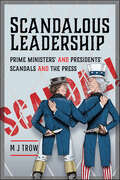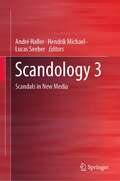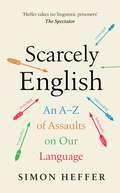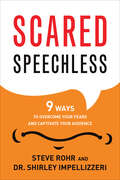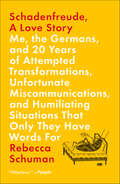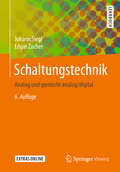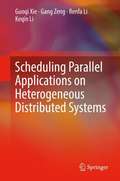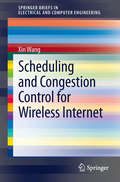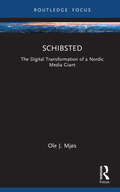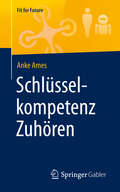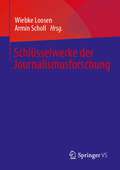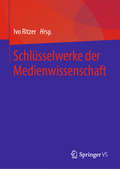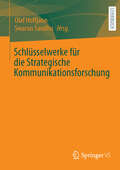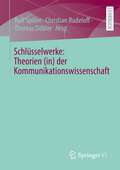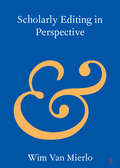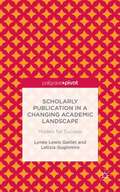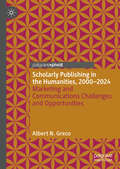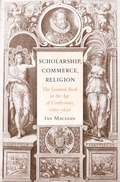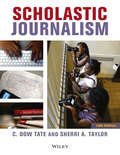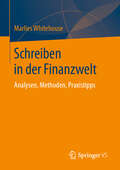- Table View
- List View
Scaling Teams: Strategies for Building Successful Teams and Organizations
by Alexander Grosse David LoftesnessLeading a fast-growing team is a uniquely challenging experience. Startups with a hot product often double or triple in size quickly—a recipe for chaos if company leaders aren’t prepared for the pitfalls of hyper-growth. If you’re leading a startup or a new team between 10 and 150 people, this guide provides a practical approach to managing your way through these challenges.Each section covers essential strategies and tactics for managing growth, starting with a single team and exploring typical scaling points as the team grows in size and complexity. The book also provides many examples and lessons learned, based on the authors’ experience and interviews with industry leaders.Learn how to make the most of:Hiring: Learn a scalable hiring process for growing your teamPeople management: Use 1-on-1 mentorship, dispute resolution, and other techniques to ensure your team is happy and productiveOrganization: Motivate employees by applying five organizational design principlesCulture: Build a culture that can evolve as you grow, while remaining connected to the team’s core valuesCommunication: Ensure that important information—and only the important stuff—gets through
Scandal (The Tainted series #1)
by Aimee DuffyFunny and provocative, prepare to fall in love with Scandal.What had she done?Branded a cheater and wild Playboy, Sebastian Collins’ glittering career as a pro-tennis player is almost over – thanks to an ex-fiancé set on revenge. His jet set lifestyle is cut short when his manager insists he salvage what’s left of his reputation.Alicia Simpson, PR Maven and daughter of a powerful and respected Earl, is brought in to salvage Sebastian’s image and restore him to glory. But Alicia has problems of her own - her past has broken her in more ways than one and she’s determined to change.Not even her new client, charming bad boy Sebastian, can hold her back. At least, until she gets to know the man beneath the media spotlight,
Scandal and Democracy: Media Politics in Indonesia
by Mary E. McCoySuccessful transitions to enduring democracy are both difficult and rare. In Scandal and Democracy, Mary E. McCoy explores how newly democratizing nations can avoid reverting to authoritarian solutions in response to the daunting problems brought about by sudden change. The troubled transitions that have derailed democratization in nations worldwide make this problem a major concern for scholars and citizens alike.This study of Indonesia's transition from authoritarian rule sheds light on the fragility not just of democratic transitions but of democracy itself and finds that democratization's durability depends, to a surprising extent, on the role of the media, particularly its airing of political scandal and intraelite conflict. More broadly, Scandal and Democracy examines how the media's use of new freedoms can help ward off a slide into pseudodemocracy or a return to authoritarian rule. As Indonesia marks the twentieth anniversary of its democratic revolution of 1998, it remains among the world's most resilient new democracies and one of the few successful democratic transitions in the Muslim world. McCoy explains the media's central role in this change and corroborates that finding with comparative cases from Mexico, Tunisia, and South Korea, offering counterintuitive insights that help make sense of the success and failure of recent transitions to democracy.
Scandal in Japan: Transgression, Performance and Ritual (Japan Anthropology Workshop Series)
by Igor PrusaThis book is an exploration of media scandals in contemporary Japanese society. Shedding new light on the study of scandal in Japan, the book offers a novel view of scandal as a specific social ritual which follows moral disturbances in Japanese society. Society and culture are analyzed largely in terms of social performances, while the focus is on how Japanese transgressors talk and act when explaining their scandals to the public. A detailed analysis of three case studies is provided: the drug scandal of the popular Japanese celebrity Sakai Noriko from 2009, the political donation scandal from 2009 centering the heavyweight politician Ozawa Ichirō, and the Olympus accounting fraud revealed by the British CEO Michael Woodford in 2011. This book will appeal to students and scholars of Japanese culture and society, anthropology, communication and media studies.
Scandalize My Name: Black Feminist Practice and the Making of Black Social Life (Commonalities)
by Terrion L. WilliamsonFrom sapphire, mammy, and jezebel, to the angry black woman, baby mama, and nappy-headed ho, black female iconography has had a long and tortured history in public culture. The telling of this history has long occupied the work of black female theorists—much of which has been foundational in situating black women within the matrix of sociopolitical thought and practice in the United States. Scandalize My Name builds upon the rich tradition of this work while approaching the study of black female representation as an opening onto a critical contemplation of the vagaries of black social life. It makes a case for a radical black subject-position that structures and is structured by an intramural social order that revels in the underside of the stereotype and ultimately destabilizes the very notion of “civil society.”At turns memoir, sociological inquiry, literary analysis, and cultural critique, Scandalize My Name explores topics as varied as serial murder, reality television, Christian evangelism, teenage pregnancy, and the work of Toni Morrison to advance black feminist practice as a mode through which black sociality is both theorized and made material.
Scandalous Leadership: Prime Ministers' and Presidents' Scandals and the Press
by M. J. TrowAn exploration of the moral blemishes that have dogged the leaders of Great Britain and the United States. Before Britain had a prime minister – and before they invented America – the dictator Oliver Cromwell urged the artist Lely to paint him ‘warts and all’. This book deals with some of the ‘all’, but is mostly about the warts, the moral blemishes that have dogged the leaders of two of the greatest countries on earth for 300 years. Scandalously, there are still no qualifications necessary for the job of prime minister or president, two of the most important positions in the world. And that lack of ability shows itself in spades throughout these pages. Robert Walpole knew that ‘every man has his price’ and bought people accordingly. Viscount Goderich broke down in tears, begging the king to fire him. George Washington, the revered saint of American creation, blew with the wind and owned slaves. Abraham Lincoln was prepared to send African Americans back to Africa to save the Union. William Gladstone popped out from Downing street to ‘save’ prostitutes. David Lloyd George gave people titles for money. Warren Harding had a string of mistresses, as did John Kennedy. And all this happened before Donald Trump! Thank God the fourth estate was there, the free press watching every move of politicians. Who was watching them, of course, is another story. If you thought – and prayed – that the occupants of No. 10 and the White House were honorable, competent people, you’re in for a bit of a shock.
Scandology 3: Scandals in New Media
by André Haller Hendrik Michael Lucas SeeberThis book presents research on mediated scandals and substantiates the understanding of such forms of scandals and their impact on societies. Additionally, it connects the study of scandals with the broader fields of political communication research, organizational communication, journalism studies, and digital communication research.The authors focus on the 21st century as an age of perpetual scandalization and on digital technologies as a catalyst in this respect. Against this backdrop, the book examines different aspects of the transformation of mediated scandals through digital communication practices.Topics covered include, but are not limited to, the scandalizing potential of new media and the requirement of modified strategies of reputation management and crisis communication in politics, the entertainment industry, and the economic system among others; a different perspective on professional journalism and scandals created through new media; technological infrastructure and digital tools allowing journalists to establish new means to investigate hard scandals, i.e., substantial financial or political wrongdoings by the economic and political elite.The book, therefore, is a must-read for researchers and scholars from different disciplines, as well as practitioners and policy-makers interested in a better understanding of the study of scandals, their impact on societies, and their catalyzation through new media.
Scarcely English: An A to Z of Assaults On Our Language
by Simon HefferThe English language has evolved throughout its history, and usually for good reasons. However, in recent years, egged on by social media and the ubiquity and velocity of the internet, it has been subject to some grave assaults. There appear no longer to be any rules, in an era when, thanks to the web (another word to have changed its meaning) everyone can be a published author, completely unedited and unregulated. This often has dire consequences for the English tongue.Simon Heffer's A to Z runs though a whole litany of common confusions ('flaunt' and 'flout', 'imply' and 'infer', 'uninterested' and 'disinterested'), unidiomatic English ('fed up of', 'focus around', the use of 'impacted' in such construction as 'the loss impacted him badly'), and lazy expressions (these days every extended activity is an '-athon', every scandal is a 'Something-gate'). It bemoans some truly awful neologisms, 'infotainment' and 'funwashing' among them. And it registers the horror of those of us who do not believe that you can answer the question 'How are you?' with the words 'I'm good'.Trenchant and sprinkled with dry wit, Scarcely English is both a chamber of horrors of bad and lazy English and a plea for accuracy, clear thinking and elegance.
Scared Speechless: 9 Ways to Overcome Your Fears and Captivate Your Audience
by Shirley Impellizzeri Steve RohrPanic at the podium? This guide by a clinical psychologist and a Hollywood publicist will help you understand—and overcome—your public-speaking fears.What you say and how you say it speaks volumes about your professional promise and leadership potential. Whether it’s giving an impromptu sales pitch or keynoting a major business conference, public speaking can make you or break you. Are you scared yet? No surprise—most people are! In fact, it’s the #1 fear among Americans. Even many Academy Award winners still get the jitters, as talent rep and publicist Steve Rohr knows very well.Scared Speechless takes a powerful, unique approach that sets it apart from other public-speaking guides. Rohr’s coauthor, Dr. Shirley Impellizzeri, uses the psychology behind our fears to explain and tame our anxiety. Combine this knowledge with humorous anecdotes, real-world examples, and wisdom about the art of organizing and delivering a spectacular speech, and you have the freshest, most entertaining, and most effective public speaking book available.
Schadenfreude, A Love Story
by Rebecca Schuman“A wild and wonderful ride” from a comic memoirist “who writes brilliantly about Germany and Germans . . . and being young and insane. . . . just read it, ok?” (Dave Barry, Pulitzer Prize–winning, New York Times–bestselling author of Best. State. Ever).You know that feeling you get watching the elevator doors slam shut just before your toxic coworker can step in? There’s a word for this mix of malice and joy, and the Germans invented it. It’s Schadenfreude, deriving pleasure from others’ misfortune. Misfortune happens to be a specialty of Rebecca Schuman—and this is great news for the Germans. For Rebecca adores the Vaterland with a single-minded passion.Let’s just say the affection isn’t mutual.Schadenfreude is the story of a teenage Jewish intellectual who falls in love—with a boy (who breaks her heart), a language (that’s nearly impossible to master), a culture (that’s nihilistic, but punctual), and a landscape (that’s breathtaking when there’s not a wall in the way). Rebecca is a misunderstood 90’s teenager with a passion for Pearl Jam and Ethan Hawke circa Reality Bites, until two men walk into her high school Civics class: Dylan Gellner, with deep brown eyes and an even deeper soul, and Franz Kafka, hitching a ride in Dylan’s backpack. These two men are the axe to the frozen sea that is Rebecca’s spirit, and what flows forth is a passion for all things German.At once a snapshot of a young woman finding herself, and a country starting to stitch itself back together after nearly a century of war, Schadenfreude, A Love Story is a hilarious and heartfelt memoir proving that sometimes the truest loves play hard to get.“Spit-out-your-schnitzel funny.” —Pamela Druckerman, New York Times–bestselling author of Bringing Up Bébé
Schaltungstechnik: Entwicklungsmethodik, Funktionsschaltungen, Funktionsprimitive Von Schaltkreisen (Springer-Lehrbuch)
by Johann Siegl Edgar ZocherDas Lehrbuch bietet eine gründliche und systematische Einführung in die Entwicklungs- und Analysemethodik analoger und gemischt analog/digitaler Schaltungen. Leser lernen, wie Schaltungen erfolgreich entwickelt werden können. Wesentlich hierfür ist die funktionsorientierte Vorgehensweise, die durch eine Einführung in die Abschätzanalyse und in rechnergestützte Entwurfsverfahren unterstützt wird. Mit vielen anschaulichen Beispielen und Übungsaufgaben. Zusätzlich kann ein virtuelles Labor mit 300 Experimenten und weiteren Aufgaben genutzt werden.
Scheduling Parallel Applications on Heterogeneous Distributed Systems
by Gang Zeng Guoqi Xie Renfa Li Keqin LiThis book focuses on scheduling algorithms for parallel applications on heterogeneous distributed systems, and addresses key scheduling requirements – high performance, low energy consumption, real time, and high reliability – from the perspectives of both theory and engineering practice. Further, it examines two typical application cases in automotive cyber-physical systems and cloud systems in detail, and discusses scheduling challenges in connection with resource costs, reliability and low energy. The book offers a comprehensive and systematic treatment of high-performance, low energy consumption, and high reliability issues on heterogeneous distributed systems, making it a particularly valuable resource for researchers, engineers and graduate students in the fields of computer science and engineering, information science and engineering, and automotive engineering, etc. The wealth of motivational examples with figures and tables make it easy to understand.
Scheduling and Congestion Control for Wireless Internet
by Xin WangThis brief proposes that the keys to internet cross-layer optimization are the development of non-standard implicit primal-dual solvers for underlying optimization problems, and design of jointly optimal network protocols as decomposition of such solvers. Relying on this novel design-space oriented approach, the author develops joint TCP congestion control and wireless-link scheduling schemes for wireless applications over Internet with centralized and distributed (multi-hop) wireless links. Different from the existing solutions, the proposed schemes can be asynchronously implemented without message passing among network nodes; thus they are readily deployed with current infrastructure. Moreover, global convergence/stability of the proposed schemes to optimal equilibrium is established using the Lyapunov method in the network fluid model. Simulation results are provided to evaluate the proposed schemes in practical networks.
Schibsted: The Digital Transformation of a Nordic Media Giant (Global Media Giants)
by Ole J. MjøsThis is the first book of its kind to examine Schibsted, one of the largest traditional media and newspaper companies in the Nordic region, which is today considered a regional and international digital media pioneer.The book examines the rise and role of Schibsted - an early mover and proactive media company in terms of technology adoption, digitization, and online expansion - in its home region, along with its major international ventures. The book focuses on its position in the Nordic digital media landscape, one of the world’s most digitally mature media markets and most digitally networked region, which is today influenced by fierce competition from expanding global internet giants and platform infrastructure. Drawing on a wealth of sources, including original interviews with senior Schibsted executives, which allow unprecedented insight into the company, the book also details its digital expansion internationally, and particularly its pioneering role as originator of the world’s largest online classified advertising company.This book will be of interest to students and scholars of global media and communication studies, particularly those specializing in international communication and media industries in a global context.
Schlüsselkompetenz Zuhören (Fit for Future)
by Anke AmesHaben Sie noch ein Ohr fürs Wesentliche? Für Ihre Geschäftspartner, Ihre Kollegen, Ihre Mitarbeiter und nicht zuletzt für Ihr engstes Umfeld? Oder kommunizieren auch Sie schon vorwiegend einseitig über Smartphone, E-Mail und Co? Die zunehmende Digitalisierung und Zeitnot unserer Leistungsgesellschaft erschweren den echten zwischenmenschlichen Austausch.Dieses Buch stellt die häufig unterschätzte und manchmal sogar in Vergessenheit geratene Fähigkeit des Zuhörens in den Fokus. Es zeigt auf, wie echtes Zuhören im Job gelingt und welche Vorteile dies mit sich bringt. Zuhören schafft Verbindung und wird in Zukunft eine der wichtigsten beruflichen Schlüsselkompetenzen werden.Über die Buchreihe "Fit for Future"Die Zukunft wird massive Veränderungen im Arbeits- und Privatleben mit sich bringen. Tendenzen gehen sogar dahin, dass die klassische Teilung zwischen Arbeitszeit und Freizeit nicht mehr gelingen wird. Eine neue Zeit – die sogenannte „Lebenszeit“ – beginnt. Laut Bundesregierung werden in den nächsten Jahren viele Berufe einen tiefgreifenden Wandel erleben und in ihrer derzeitigen Form nicht mehr existieren. Im Gegenzug wird es neue Berufe geben, von denen wir heute noch nicht wissen, wie diese aussehen oder welche Tätigkeiten diese beinhalten werden. Betriebsökonomen schildern mögliche Szenarien, dass eine stetig steigende Anzahl an Arbeitsplätzen durch Digitalisierung und Robotisierung gefährdet sind. Die Reihe „Fit for future“ beschäftigt sich eingehend mit dieser Thematik und bringt zum Ausdruck, wie wichtig es ist, sich diesen neuen Rahmenbedingungen am Markt anzupassen, flexibel zu sein, seine Kompetenzen zu stärken und „Fit for future“ zu werden. Der Initiator der Buchreihe Peter Buchenau lädt hierzu namhafte Experten ein, ihren Erfahrungsschatz auf Papier zu bringen und zu schildern, welche Kompetenzen es brauchen wird, um auch künftig erfolgreich am Markt zu agieren. Ein Buch von der Praxis für die Praxis, von Profis für Profis. Leser und Leserinnen erhalten „einen Blick in die Zukunft“ und die Möglichkeit, ihre berufliche Entwicklung rechtzeitig mitzugestalten.
Schlüsselwerke der Journalismusforschung
by Wiebke Loosen Armin SchollWie in anderen Forschungsfeldern gibt es auch in der Journalismusforschung Schlüsseltexte, die ein Forschungsgebiet erschlossen haben, auf dem weitere Forschung aufbaut. Der Band versammelt solche Schlüsselwerke und stellt sie in Kurzbeschreibungen vor. Zusätzlich werden sie in den Forschungskontext eingebettet und ihre Wirkung auf den weiteren Fortgang der Forschungstradition erläutert. Schließlich werden sie in Bezug auf ihre Bedeutung für aktuelle Fragen und Themen der Journalismusforschung eingeschätzt.
Schlüsselwerke der Medienwissenschaft
by Ivo RitzerDer Band stellt ausgewählte Positionen und zentrale Ideen im disziplinären Rahmen der Medienwissenschaft vor. Schwerpunkte liegen auf medienphilosophischen Ansätzen und einer kulturtheoretischen Perspektive, die sich vor einem dezidiert geisteswissenschaftlichen Horizont konturiert. Dabei versteht der Band sich nicht nur als Handbuch und Nachschlagewerk für Studierende wie Lehrende, er soll vielmehr auch einen eigenen Beitrag zur medienwissenschaftlichen Theoriebildung leisten.
Schlüsselwerke für die Strategische Kommunikationsforschung
by Olaf Hoffjann Swaran SandhuDie strategische Kommunikationsforschung hat seit jeher Theorien anderer kommunikationswissenschaftlicher Forschungsfelder und wissenschaftlicher Disziplinen aufgegriffen, um mit diesen den eigenen Beobachtungsgegenstand zu beschreiben. Wenn man das als Defizit sehen möchte, beklagt man schnell den fehlenden eigenen Kern des Forschungsfeldes. Der Band „Schlüsselwerke für die strategische Kommunikationsforschung“ versteht dies ausdrücklich als Stärke und wirbt für die Potenziale dieser offenen Vorgehensweise. Wie arm wäre die strategische Kommunikationsforschung ohne Giddens, Goffman, Habermas, Luhmann, Meyer & Rowan, Weick und Co? Daher stehen in dem Band keine Schlüsselwerke der, sondern Schlüsselwerke für die strategische Kommunikationsforschung im Mittelpunkt. Die 42 vorgestellten Schlüsselwerke haben die strategische Kommunikationsforschung in der Vergangenheit geprägt oder haben das Potenzial, sie in den nächsten Jahren nachhaltig zu beeinflussen. Der Band ist in die fünf Abschnitte Strategie & Kommunikation, Gesellschaft & Öffentlichkeit, Organisation & Entscheidung, Wirkungen & Wirklichkeit(en) und Macht & Kritik gegliedert. Jeder Abschnitt beginnt mit einem einführenden Überblicksbeitrag, der die Schlüsselwerke einordnet und einen Überblick über die zentralen Fragen und Diskurse des jeweiligen Forschungsbereichs gibt.
Schlüsselwerke: Theorien (in) der Kommunikationswissenschaft
by Thomas Döbler Ralf Spiller Christian RudeloffDer Band gibt eine kompakte Übersicht zu zentralen Theorien (in) der Kommunikationswissenschaft. Insgesamt werden 28 Schlüsselwerke aus der Mikro-, Meso und Makro-Ebene vorgestellt. Ziel ist es, Studierende und Dozierende in den Stand zu versetzen, ein wesentliches Werk in dessen Kontext zu verstehen und in die jeweilige Fachdiskussion einzuordnen. Darüber hinaus wird in diesem Band die Frage diskutiert, welches analytische und empirische Potenzial von den „Klassikern“ in Zeiten digitaler Kommunikation ausgeht.
Scholarly Editing in Perspective (Elements in Publishing and Book Culture)
by Wim Van MierloScholarly Editing in Perspective offers a critical reflection on the theory and methods of textual editing, as a contribution to a wider, comparative understanding of editorial practice. The analysis, written in a cogent, concise and accessible manner, offers an insight into the textual-philosophical principles and foundations of scholarly editing from the beginning of the twentieth century to the new opportunities offered by digital technologies in the twenty-first. Scholarly editing is presented as a process that makes an intervention in the text whereby the editor mediates between competing versions of textuality, authorship, and authority. In analysing the assumptions, beliefs, and critical underpinnings of scholarly editing, this Element provides a new perspective on the standard editorial models within the English tradition, how they have evolved, and how they are adapted for the digital age.
Scholarly Publication in a Changing Academic Landscape: Models for Success
by Lynée Lewis Gaillet Letizia GuglielmoScholarly Publication in a Changing Academic Landscape focuses on ways contingent faculty members can join scholarly conversations by making public the work they are already engaged in and how they might publish their way into increased fulfillment and increased job security. Recognizing that contingent faculty often find few opportunities to enroll in publication courses, take advantage of professional development and mentoring sessions, or find allies and peers within their departments, this volume outline the realities of contingent employment and offers concrete advice for maintaining a research and publishing agenda, even without department support. The authors suggest ways to work within the present system, offering concrete strategies for engaging in professional development opportunities and disseminating research findings.
Scholarly Publishing in the Humanities, 2000-2024: Marketing and Communications Challenges and Opportunities (Marketing and Communication in Higher Education)
by Albert N. GrecoThis book explores the recent history and future directions of scholarly publishing in the humanities in the United States from a marketing and communications perspective. The study draws on statistical surveys and data from a multidude of sources in order to analyze the major challenges confronting the humanities in higher education as well as the opportunities for print and digital publication since 2000. Chapters cover all types of publishing from university to trade presses, libraries, national programs, and self publishing, and focuses on changes in higher education funding, the impact of disruptive technologies such as AI, and the importance of global markets in disseminating new research in the humanities. The author explores these trends and other relevant theories, practices, and examples to achieve a better understanding of why publishing scholarly books and journals in the humanities is, and will remain, a critically important yet complicated component of the higher education landscape.
Scholarship, Commerce, Religion
by Ian MacleanA decade ago in the Times Literary Supplement, Roderick Conway Morris claimed that almost everything that was going to happen in book publishing-from pocket books, instant books and pirated books, to the concept of author’s copyright, company mergers, and remainders-occurred during the early days of printing. Ian Maclean’s colorful survey of the flourishing learned book trade of the late Renaissance brings this assertion to life. The story he tells covers most of Europe, with Frankfurt and its Fair as the hub of intellectual exchanges among scholars and of commercial dealings among publishers. The three major religious confessions jostled for position there, and this rivalry affected nearly all aspects of learning. Few scholars were exempt from religious or financial pressures. Maclean’s chosen example is the literary agent and representative of international Calvinism, Melchior Goldast von Haiminsfeld, whose activities included opportunistic involvement in the political disputes of the day. Maclean surveys the predicament of underfunded authors, the activities of greedy publishing entrepreneurs, the fitful interventions of regimes of censorship and licensing, and the struggles faced by sellers and buyers to achieve their ends in an increasingly overheated market. The story ends with an account of the dramatic decline of the scholarly book trade in the 1620s, and the connivance of humanist scholars in the values of the commercial world through which they aspired to international recognition. Their fate invites comparison with today’s writers of learned books, as they too come to terms with new technologies and changing academic environments.
Scholastic Journalism
by Sherri A. Taylor C. Dow TateThe new 12th edition of Scholastic Journalism is fully revised and updated to encompass the complete range of cross platform multimedia writing and design to bring this classic into the convergence age.Incorporates cross platform writing and design into each chapter to bring this classic high school journalism text into the digital ageDelves into the collaborative and multimedia/new media opportunities and changes that are defining the industry and journalism education as traditional media formats converge with new technologiesContinues to educate students on the basic skills of collecting, interviewing, reporting, and writing in journalismIncludes a variety of new user-friendly features for students and instructorsFeatures updated instructor manual and supporting online resources, available at www.wiley.com/go/scholasticjournalism
Schreiben in der Finanzwelt: Analysen, Methoden, Praxistipps
by Marlies WhitehouseDas Buch erfasst zuerst den komplexen und dynamischen Kontext, in dem Schreiben in der Finanzwelt geschieht, und untersucht dann am Beispiel einer zentralen Textsorte, was diese Textprodukte tatsächlich leisten. Schließlich entwickelt das Buch forschungsbasierte Werkzeuge, die den Kommunikationserfolg von Finanztexten systematisch und wirksam verbessern können.
